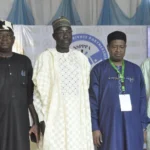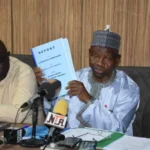NNPC Weekly: FG optimistic of accessible funding for gas development

NNPC
By Edith Ike-Eboh and Emmanuel Afonne
Abuja, May 9, 2022 (NAN) The Nigerian National Petroleum Company Limited (NNPC Ltd.) started its week with high optimism that its plan for gas development would turn around the fortune of the country economically.
The Minister of State for Petroleum Resources, Chief Timipre Sylva, shared this view at the 2022 Annual Public Lecture of the Nigerian Society of Engineers (NSE), Bwari Branch, Abuja.
The theme of the lecture was “Inclusive Energy Transition: Key Issues, Investment Opportunities and Barriers Towards Achieving the Decades of Gas Initiative in Nigeria”.
Sylva said he is optimistic that the plan by European Union (EU) to designate natural gas as ‘green energy’ would guarantee access to more funding for gas development projects in the country, to power its “Decade of Gas Initiative”.
The Minister stated that the chances of accessing the needed funding to boost gas production to meet domestic and export demands are getting brighter with the series of requests by European nations for more gas supplies from Nigeria.
It would be recalled that recently, EU delegation made up of top diplomats from Spain, Portugal, Italy, France and Belgium visited Sylva and the Chief Executive Officer (CEO) of NNPC, Malam Mele Kyari, on quest for more gas supplies from Nigeria.
According to Sylva, the EU’s request came with a proposal to rebrand gas as ‘green energy’.
“And luckily for Nigeria, the European Union has proposed labelling natural gas as a ‘green energy’ source, a development that could translate into huge economic value for Nigeria.
“The decade of gas is a decade of opportunities – ranging from a decade of elimination of gas flaring, a decade of more domestic Liquefied Petroleum Gas (LPG), a decade of fully gas-powered economy and natural gas”.
He stated that government had a key role to play in facilitating the right atmosphere for the private sector to thrive so that Nigeria’s economy can compete in the global sphere.
He listed the three major priorities of the Federal Government in energising the economy to include: security of supply, economic competitiveness, and a reduction of greenhouse gas emissions.
“At present, only gas can meet all three priorities simultaneously.
“This puts Nigeria with approximately 206.53 trillion cubic feet (TCF) of proven gas valued at over $803.4 trillion and a potential upside of 600TCF of gas, the most extensive in Africa, and in the top 10 globally”.
The Minister explained that Nigeria was following a transition pathway that combines technology, investment, business strategies, and government policy to transit from its current energy system to a low-carbon system with natural gas playing a pivotal role over the next decade.
He stressed that that is the idea behind the “Decade of Gas Initiative” of the Federal Government.
Sylva noted that in spite of the constantly changing technology, Nigeria had huge natural gas reserves and highly skilled workforce that had positioned it to pioneer future natural gas technology and compete in global markets.
To achieve this, he said that individuals, corporate Nigeria and professional associations like the NSE, as well as governments at all levels, must promote a new awareness, an energy literacy that includes a profound understanding that energy pervades all aspects of life.
He said that engineering skills were required to achieve the aspirations of many of the 17 Sustainable Development Goals (SDGs), especially goal No. 7 that called for “affordable, reliable, sustainable and modern energy for all” by 2030.
He called on members of the NSE to leverage on the existing and future technologies, including next-generation mobile broadband, the Internet of Things (IoT), artificial intelligence, 3D printing and others, to provide the tools for integrated solutions for the decade of gas.
“The NSE needs to lend its voice to the contributions of engineers in progressing the decade of gas initiative through its network of national and international engineering member institutions.
“The NSE should contribute to the discourse on the role of engineering and engineers in the development of technologically and environmentally feasible solutions for Nigeria.
“We need to partner in this journey to deal with the energy poverty in the country.
“We must find a way to unlock the natural gas potential of Nigeria and drag millions of our people out of energy poverty”.
Sylva insisted that the president’s assent to the Petroleum Industry Bill (PIB) on Aug. 16, 2021, had marked the end of decades of inaction, ambiguity, indecision, and under-investment in Nigeria’s petroleum industry.
He reiterated the need for Africa to establish an African Energy Bank (AEB) to address its own peculiar energy related crisis and take Africans out of the doldrums of energy poverty in line with SDG 7.

Meanwhile, Chairman, Board of the NNPC Ltd., Sen. Margery Chuba-Okadigbo, commended the Nigerian delegation at the 2022 Offshore Technology Conference (OTC) in Houston, Texas, United States.
Chuba-Okadigbo gave the commendation while declaring open the OTC Nigerian exhibition pavilion at the conference.
She said it is a thing of joy and pride that Nigeria was well represented at the conference.
“I am delighted to declare this exhibition open. Again, it’s a thing of joy and pride to see you Nigerians well represented in foreign countries”.
Earlier in his remarks, Chairman of the Nigeria Pavillion Opening Ceremony at the OTC, Mr Chinedu Maduakoh, said time had come for Nigeria and other African nations to pursue their energy transition dreams.
He said: “The clean energy transition debate, no doubt, presents an opportunity for many African countries to chart sustainable energy systems of their own, but capital is an enormous mitigating factor which calls for strengthened regional action to address existing barriers and identify practical steps which regional governments can take to promote capital deployment and adopt the technologies best suited for their region.
“Africa, home to one-sixth of the global population and accounting for less than 6 per cent of the global energy consumption and 2 per cent of cumulative global emissions according to reports, still has a comparative advantage and potential growth in the energy sector even as fossil fuels remain our enduring source of government revenue.
“However, bridging the finance gap, embracing new technologies, and replicating successful models in other sectors can help to further increase value-retention along the global value chain.
“It will also deepen the process of economic integration in alignment with the African Continental Free Trade Area (AfCFTA) Agreement which has the potential to lift more Africans out of the vicious cycle of poverty and inter-generational dependency”.
On his part, the Chairman of the Petroleum Technology Association of Nigeria (PETAN), Mr Nicolas Odinuwe, said that the theme of the Nigerian exhibition pavilion, “Energy Transition and the Future of Africa” was carefully chosen to reflect the current realities in African oil and gas industry.
Odinuwe called on leaders of the Nigerian oil and gas industry to continue to echo PETAN’s called to deepen Nigerian content as always and implored the Board of the NNPC Ltd. to collaborate with the association.
“OTC means different things to different people. But thanks to PETAN’s focused participations.
“PETAN and Nigeria have built capacities, capabilities and visibility. PETAN has been the host of the Nigerian Pavilion for over 15 years.
“And we have been fully supported by the NNPC (now NNPC Limited) which is in transition.
“We are here to continue to propagate, advocate and advance technology that has led to Nigeria being the only country in Sub-Saharan Africa with a robust exploration and production service industry”.
According to the chairman, OTC gives all its participants access to leading-edge technical information and opportunity to showcase companies’ capabilities to over 1,000 delegates and over 250 companies in the oil and gas Industry.
He said that PETAN had been responsible for leading and hosting the Nigerian government agencies, stakeholders, oil and gas companies and investors at the OTC yearly.
Odinuwe added that Nigeria had the fifth largest representation of over 60 participating countries in 2019.
PETAN is an association of indigenous Technical Oilfield Service Companies.
Still in the week under review, the Port Harcourt Refining Company (PHRC) recorded a 1,689 per cent increase in the value of its assets from N15billion to N268billion as at Dec. 31, 2021.
This was disclosed at the 15th Annual General Meeting of the company which held at the NNPC Towers, Abuja, with some virtual participation.
Speaking at the meeting, the GMD/CEO of NNPC Ltd., Malam Mele Kyari, who is the Chairman of PHRC’s Board of Directors, explained that the astronomical rise in the value of the company’s assets was attributable to NNPC Management’s decision to transfer previously held SBUs assets to the respective subsidiaries.
This, according to the GMD, who was represented by the Group Executive Director, Gas and Power, Mr Mohammed Ahmed, saw the transfer of the refining plant with a net book value of N255bn to PHRC and was reported in its books accordingly for the first time in the history of the company.
He stated that the singular act of transferring the assets to the company had increased the financial portfolio of PHRC and would stimulate the interest of foreign investors as well as increase its capacity for external funding whenever the need arises.
The GMD also reiterated the commitment of NNPC to ensuring constant and copious availability of petroleum products in the country after the rehabilitation of the Port Harcourt Refinery to avert a repeat of the supply hitch experienced recently.
He also disclosed that PHRC was totally poised to “strategically leverage on the benefits accruing from the restoration of capacity utilisation upon the successful completion of rehabilitation to attain optimal, competitive and profitable operation in a global commercial environment”.
Kyari said the refinery would operate at a minimum of 90 per cent capacity post-rehabilitation, adding that refining would be accorded greater attention in keeping with the objectives of the PIA which seeks to reposition the oil and gas industry in conformity with global practices.

The immediate past Managing Director of the NNPC Retail Ltd., Mrs Elizabeth Aliyuda, had described the recent declaration of profit by the NNPC Ltd. as the most memorable moment in her 35 years of service to the company.
The former NNPC Retail helmsman said that she was delighted to have witnessed the turnaround in the fortunes of NNPC during her tenure as Managing Director, NNPC Retail Ltd.
Commenting on the concerns raised by some stakeholders regarding the effects of the PIA on the fortunes of operators in the industry, Aliyuda admonished staff members to embrace the new fiscal regime with courage and confidence.
She stressed that if the NNPC could make N287billion profit prior to the enactment of the legislation, a greater future lies ahead for the company and other operators in the PIA era.
She advised staff of NNPC to remain committed to the implementation of policies that would open up viable business opportunities for the company’s steady growth and profitability.
Some of the dignitaries that attended the event were the CEO, Nigerian Upstream Regulatory Commission (NUPRC), Mr Gbenga Komolafe and CEO, Nigerian Midstream, Downstream Petroleum Regulatory Authority (NMDPRA), Mr Farouk Ahmed.
Others were GED, Downstream, Mr Yemi Adetunji; GED, Refineries and Petrochemicals, Mr Mustapha Yakubu and former GED Venture/ Former MD, NNPC Retail, Sir Billy Okoye.
In another development, the Organisation of the Petroleum Exporting Countries (OPEC) raised Nigeria’s crude oil production quota to 1.772mbpd for June 2022 from 1.735 million barrels per day (mbpd).
The approval was for May 2022.
A statement by the organisation stated that the decision was taken at the 28th OPEC and non-OPEC Ministerial Meeting.
Consequently, the new target for Nigeria going forward stood at 19,000bpd higher than the approved quota for May 2022.
OPEC also adjusted upward the monthly overall production by 432,000bpd for the month of June 2022 with a target production of 42.558mbpd.
“Following the conclusion of the OPEC 28th and non-OPEC Ministerial Meeting, held via videoconference on May 5, it was noted that continuing oil market fundamentals and the consensus on the outlook pointed to a balanced market.
“It further noted the continuing effects of geopolitical factors and issues related to the ongoing pandemic,” the statement said.
Meanwhile the Secretary-General of OPEC, Mohammed Barkindo lamented the negative effect of the ongoing war in Ukraine on the global energy market.
Speaking at the virtual 62nd meeting of the Joint Technical Committee (JTC) of the organisation, Barkindo said the Russia-Ukraine war had caused huge volatility in the global energy market.
The organisation also called for sustained investment in the oil sector to expand production and ensure adequate spare capacity.
Barkindo said the conflict had compounded the uncertainties related to the pandemic.
“It has heralded in further economic volatility, elevated risk premiums for oil, as well as many other essential commodities, given that both the Russian Federation and Ukraine are key global exporters, including of essential agricultural goods,” Barkindo said.
“From the oil market perspective, however, what is clear is that Russia’s oil and other liquids exports of more than seven million barrels per day cannot be made up from elsewhere.
“The spare capacity just does not exist.”
He said the potential loss through either sanctions or voluntary actions was rippling through energy markets.
“The crises we face are causing huge volatility, with daily price swings of more than 5 dollars per barrel occurring on 13 occasions across March and April,” he added.
Visit us on www.nannews.ng for more details. (NAN)(www.nannews.ng)
ENO/EMAF/ISMA
===========
Edited by Ismail AbdulAziz
Published By
Has also recently published
 General NewsJune 27, 2024Nigeria requires N348trn to address infrastructure deficit -ICRC D-G
General NewsJune 27, 2024Nigeria requires N348trn to address infrastructure deficit -ICRC D-G BusinessJune 26, 2024Ways and means securitisation responsible for N24trn debt rise – DMO
BusinessJune 26, 2024Ways and means securitisation responsible for N24trn debt rise – DMO SportsJune 26, 2024Paris Olympics: We’re ready to surpass previous achievements – NOC
SportsJune 26, 2024Paris Olympics: We’re ready to surpass previous achievements – NOC Defence/SecurityJune 26, 2024Recruitment: Okiro urges harmony between PSC, Police
Defence/SecurityJune 26, 2024Recruitment: Okiro urges harmony between PSC, Police



